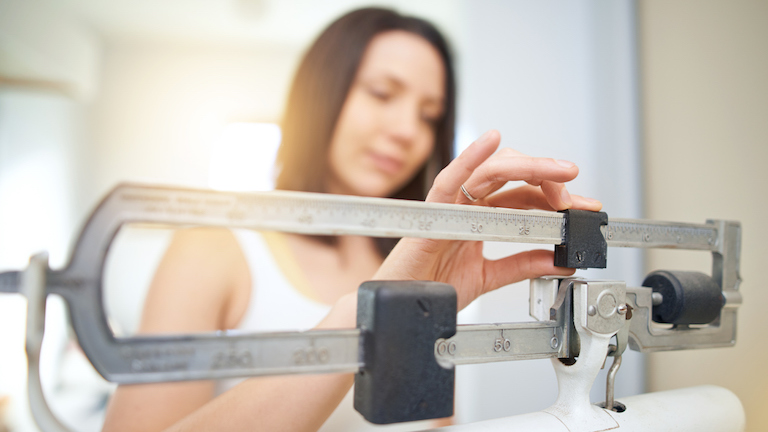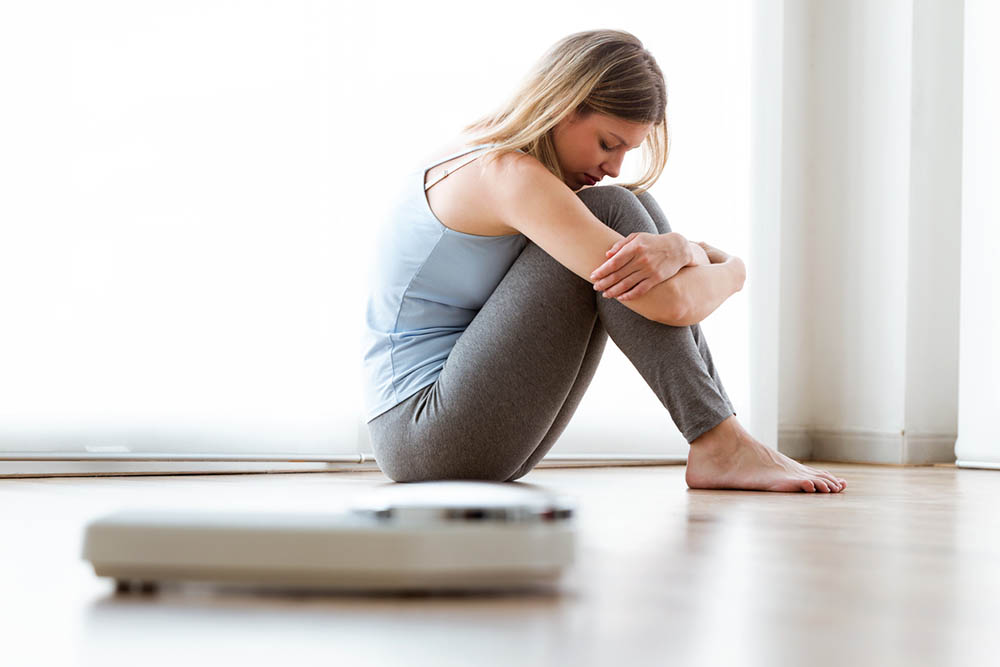Do you beat yourself up whenever you gain weight ? Habits change expert Dr Heather McKee tells you how to lose weight for good with self kindness – trust us, this works
‘The curious paradox is that when I accept myself just as I am, then I can change,’ said the psychologist Carl Rogers.
There is nothing more frustrating than when you feel you are trying your best to establish healthy eating and exercise habits and then something happens to derail you. As soon as we give into temptation or stray from our goals, as soon as we trip or stumble, we start to doubt ourselves, we scold ourselves for our lack of willpower, and we start to tumble down into the hole of shame.
When it comes to our health or weight loss goals giving in can so often mean giving up.
What’s more, instead of looking at how we could get out of this hole, what do we do?…….we dig. That’s when the negative self-talk and self-shaming starts to creep in. ‘You are never going to reach your goals’, ‘Why do you even bother?’ ‘It’s pointless trying to be something you are clearly not able to be all the time’ ‘You are just different, your just not wired right for this’.
How to lose weight and stop beating yourself up
It’s ironic that self-punishment and self-criticism have a weird way of taking away accountability. If you believe you are a failure then you become that failure and thus resolve yourself of ownership or accountability. As a result, you essentially set up camp in the hole, feeling you deserve to be there so you might as well wallow there for a while and do as much digging as you can.
Instead of focusing on our strengths to pull us out of the hole we focus on our weaknesses and reinforce this through self-sabotaging behaviours like eating emotionally. All so, we don’t have to deal with feelings of shame or failure.
This isn’t constructive and it isn’t a nice place to be.
When it comes to our health we tend to have a very black and white outlook on the process of achieving our goals. We approach our health and weight loss goals as if we can simply go from A to B in a straight line without any room for deviation off that path. Yet the truth is that life doesn’t work in that way, and with so many decisions, options and opportunities around food, improving our habits doesn’t work in that way either.
Rather than run from negative feelings and hide in a shame hole we need to become aware of them, lean into them, accept them, treat them with kindness
Research has shown that seeing failure as a learning opportunity; a chance to understand what does and doesn’t work for you and in what circumstances is a vital part of being able to build a lifestyle that supports long-term healthy habits.
A number of studies have found that those who are successful at sticking to their long-term health goals, had a different outlook on failure. Once they did something that was contradictory to their goals they looked to learn from it. They examined why they gave in to temptation. Was it because they were hungry? Stressed? Tired? Bored? Dealing with a certain emotion? Rather than berate themselves for a lack of willpower, these successful maintainers had cultivated the awareness, they had leaned into the reasons behind why it was happening and they understood that this lapse in healthy behaviours was temporary and after examining why they had strayed, and how they could overcome it in the future, they then moved on.
Essentially, they shone a light on where they were, the reality of the situation and they looked for a way out of the hole.
Yet there is a common belief that being kind to yourself undermines motivation and encourages overindulgence. The research shows the opposite.
Being more self-compassionate has been associated with improved wellbeing, increased happiness and a greater initiative to make changes in your life. Research shows that self-kindness actually supports and enhances your motivation. Those who have more self-kindness:
- Adopt growth/process focused goals (these are the goals that are associated with more positive physical and psychological outcomes) and less likely to adopt performance-based goals
- Are less likely to procrastinate towards their goals
- Have less fear of failing, and more motivation to try again after failure
- Are more successful at sticking to their healthy habits as they care about themselves and others
In order to create lasting changes in your healthy habits you need to work with your emotions and not struggle and chastise yourself against them. So how do you do this?
You accept yourself and show yourself kindness.
The truth is we are not in control of our thoughts and emotions, and the struggle to master or control them is what brings about suffering.
Real acceptance is not about admitting defeat but rather it’s about treating difficult thoughts and emotions with curiosity
Acceptance is about seeing thoughts as they are, without judgement, treating them with neutrality, they are not good or bad, they are not a reflection of your true self, they are not to be judged or dissected. Rather, what acceptance is focused on is whether your thoughts; your own internal voice (or self-talk) is constructive – is it helping you? Is it encouraging you to get to where you so desperately want to be? Is it lighting a fire under you, motivating you to stick with your goals? Is it getting you out of the hole?
When we become more self-aware and start to lean into self-kindness, something magical starts to happen. You actually tend to want to engage with your goals more, you procrastinate less, and you find you are naturally craving the things that make you feel good. We no longer need the giant tub of ice cream to numb down the pain, instead we need something else, something that will provide more than a temporary release. Instead, we tend to address what is niggling at us. We shine a light on that emotion that has been drowned out in a load of crisps. When we listen to the messages our emotions are sending us, we can then hear and therefore start to take positive steps to understand them. We can learn that we no longer want to drown out the voice, to numb it, to ignore it to punish ourselves. Instead we want to treat it with gentle, loving and encouraging kindness.
It’s when we do this that kindness is present and this is when the switch happens.
That self-kindness is the secret to long term success.
Knowing how important kindness is to making lasting changes how do you go about cultivating self-kindness habits?
Here are 7 steps to creating self-kindness habits that lead to lasting change:
1. Try thought labelling
This is the practice of sitting with your thoughts, noticing them as they come up and labelling them. For example, say you feel you have overindulged at a recent barbeque with friends. Instead of immersing yourself in negative self-talk, notice the thoughts that come up and label them. ‘Oh there is my thought about not planning in advance’, ‘There is my thought about my appearance’, and ‘There is my thought about my future happiness’. Labelling your thoughts that pop up can start to help you examine them more objectively, without involving emotions or feelings that not only make you feel miserable but also steer you off track.
2. Try to take an objective focus
Next time you find you are giving yourself a hard time about something to do with your healthy habits. Rather than diving into your thoughts and swimming around in them while they eat away at you, like swimming in piranha infested waters, try to tune in to your body in the present, what can you see, feel, hear? What is the texture of the seat you are on, what background noises both loud and quieter can you hear? What can you smell? The key here is to turn your awareness to your body and the sensations it’s experiencing in the present moment rather than allowing your mind to run away with itself instead.
3. Try letting go of the unhelpful storylines
Think about the negative thoughts or dialogues that normally pop up in response to when you go off track with your healthy habits. Think about what impact holding on to this particular thought or storyline has had and is going to continue to have on you. Can you identify specific unhelpful self-judgments that you have become fused with? The storylines you tell yourself? For example, not being good enough/thin enough/rich enough/smart enough/young enough and so on. Can you pay attention to and list these common stories? You can carry out the exercise completed in my blog on The Kindness Habit Part 1 to help you look at reframing these patterns of unhelpful thoughts.
4. Start to become aware of physiological vs emotional cues
Ask yourself throughout the day, ‘What do I need to do in this moment to take care of myself?’
‘If you can be aware of what legitimate needs and wants you’re not attending to, and then take actions to meet them on your own – that is the road to happiness,’ said the modern-day thinker Neil Strauss.
If you can, throughout the next couple of days, when you feel you are overthinking, believing your thoughts too much or simply just having a moment of temptation, discomfort, stress or emotion. Take a moment to step back and check in with yourself. Ask yourself:
What are my physiological needs night now? Not attending to thoughts or feelings in particular but rather; am I hungry, thirsty, tired?
Next, ask ‘What can I do in this moment to nourish myself?’ By practicing asking yourself this multiple times a day, you retrain your brain to attend to physiological cues rather than thoughts alone. This builds trust in the body to tell you what it is you need to take care of yourself.
5. Try a kindness check in
Leading compassion researcher Dr Kirsten Neff has a really useful exercise known as the self-kindness break:
If you have first attended to your physiological need and are still feeling it is a particular time of emotional stress/strain, you may wish to explore the below evidence based self-kindness technique:
Acknowledge the pain/strain/stress.
You can do this out loud/internally (your might say ‘this is really hard’, ‘I am suffering here’) or by simply noting where the stress/strain sits in your body (clenching of hands, shoulders, abdominals)
Acknowledge that you are not alone in your stress/suffering.
Reassure yourself that pain, stress and suffering are common to humanity (you could tell yourself things like, ‘other people feel this way’ or ‘I’m not alone’ or ‘We all struggle in our lives’).
Express kindness to yourself
‘What do I need to hear right now to express kindness to myself?’ Is there a phrase that speaks to you in your particular situation, such as:
- May I give myself the kindness that I need
- May I learn to accept myself as I am
- May I forgive myself
- May I be strong.
- May I be patient
Another option is to look at asking yourself a series of reflective questions:
- What am I feeling?
- What just happened to lead me to feel this way?
- What am I saying to myself in this situation?
- How would I like to react differently to this?
Why cultivating self-kindness is the secret for long-term success
Listen, cultivating self-kindness isn’t a skill that comes naturally. Like anything worthwhile it takes practice and repetition to become a habit. However, the impact it has on your health is crucial.
By accepting rather than battling our thoughts we start to take responsibility, we let things that hold us back go, we accept that we can’t change the past and we start to look to the present and future and take action.
Ultimately, we alleviate the struggle and thus make room to focus more on motivating thoughts. Thoughts that are going to get us to our goals faster and keep us there longer.
This is when the kindness switch happens.
You start to wake up early to exercise because it feels mentally and physically good to do so.
You stop eating whole tubs of ice cream because it doesn’t serve or nourish you anymore.
You start to listen to your real physiological hunger instead of your emotional hunger and thus eat when you’re hungry and stop when you’re full.
You start to recognise what situations are emotionally damaging for you and safeguard yourself against these using coping strategies and tools that aren’t food.
You go to the gym because it feels better to go to the gym than to have a couch day and binge on Netflix.
It’s not that difficult situations or emotions don’t still exist it’s that now you are tuned in and listening to these.
You are listening to what your emotions are trying to tell you. You can start to work with your thoughts and emotions so rather than battling against them, you shine a light on them, instead of running into the darkness. Each time you do this you grow your motivation leaving you feeling stronger, more focused and ultimately healthier and happier.
I’d like to leave you with a quote from the wonderful holistic teacher Louise L. Hay: ‘You’ve been criticising yourself for years and it hasn’t worked. Try approving of yourself and see what happens.’
More life changing long-term weight loss advice from Dr Heather McKee:
When you get serious about weight loss, these are the 3 things you need to do
A leading expert in behaviour change, Dr Heather McKee has a PhD in weight-loss psychology and specialises in coaching for habit change and weight loss, using evidence-based techniques; drheathermckee.co.uk
Her vision is to revolutionize weight loss and behaviour change to empower people and show them that it can be it enjoyable, sustainable and successful.
If you’d like to start cultivating self-kindness habits and heal your relationship with food. If you are serious about making lasting changes to your health habits then I am offering a limited number of free 20-minute phone consultation places on my open days in June for those who are willing to invest both financially and emotionally into creating long term habit change. You can sign up immediately for your free 20 minute phone call to understand if my habit coaching programme is right for you here.
More Healthista Content:
30 Day Yoga Challenge – Day 8 – Sun Salutation
15 things this TV medic wants you know about weight loss
From feeling ugly to drinking too much…7 ways childhood trauma is affecting you today
9 best skin brightening products for glowing skin
Like this article? Sign up to our newsletter to get more articles like this delivered straight to your inbox.





















































